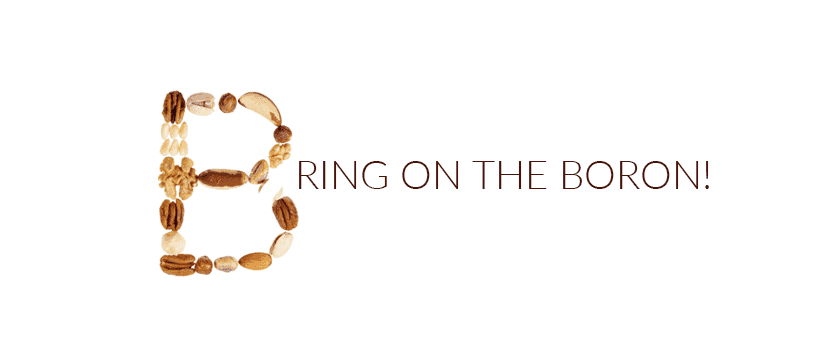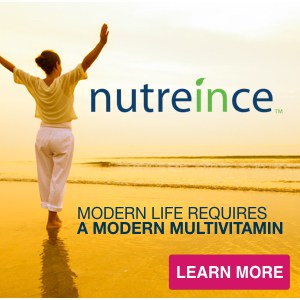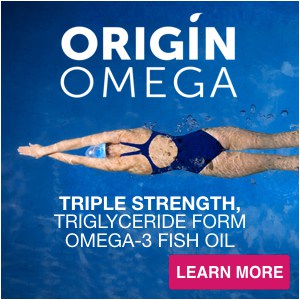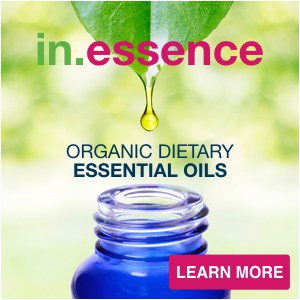Despite the fact that the trace mineral boron has been critical for the evolution of plant life on Earth and supports some of your most vital functions, most people have barely ever heard of it. That's not because boron is boring- quite the opposite! This is simply because research about boron’s effect on human health is very recent– and fascinating for anyone who wants to make sure they get the micronutrients they need to be happy and healthy!
For over a hundred years, researchers have understood that boron is required for healthy plant growth, but they didn’t look for a critical role in human health until more recently. Most of your boron is in your bone and tooth enamel, so it is probably no surprise that boron plays a critical role in bone health, as we will explain! But boron can also support sexual and mental health, reduce inflammation, enhance wound healing, and potentially more! Read on to discover what the science suggests about the benefits of boron for you!
Insufficient Boron May Increase Disease Risk
Because research into boron is emerging, it is not considered an essential mineral and neither an adequate intake (AI) nor other dietary reference intakes (DRI) for sufficiency are set for boron at this time. This means we have no way to measure potential deficiencies.
Given its important metabolic roles (explained below), low boron intake is potentially associated with problems such as slow wound healing, arthritis, and osteoporosis. These correlation are promising and warrant more study. For instance, in a study comparing Turkish residents with high and low boron intake, in areas where boron intake was at 1 – 3 mg daily, the estimated incidence of osteoarthritis ranged from 20% to 70%, but in areas with an intake between 3 and 10 mg daily, that range dove to 0-10%! This makes sense when you consider that boron affects both bone health and inflammation, both key in osteoarthritis. Associations like these give us a better understanding of how boron works in the body, and there are some promising early studies- with cancer therapy- that are starting to interest researchers.
Beyond inadequate intake, people at the greatest risk of not getting enough boron do not regularly consume adequate fruits and vegetables- our primary dietary source of boron.
Benefits of Boron
Boron supports several key metabolic processes and helps us utilize other nutrients and hormones more effectively. Boron has been shown to:
- Acts as an Antioxidant and Quells Inflammation. Boron raises levels of antioxidants like superoxide dismutase, catalase, and glutathione peroxidase, protects against pesticide induced stress and heavy metal toxicity, and reduces levels of inflammatory biomarkers such as hsCRP and TNF⍺ that underlie increased risk for many metabolic diseases. As an antioxidant, anti-inflammatory, and through other mechanisms, boron has been shown to support brain function, reduce symptoms of arthritis, support healthy bones, and potentially reduce cancer risk.[1]
Noting our correlation with boron intake earlier, in a double-blinded supplementation trial in Australia study of 20 osteoarthritis patients using 6 mg of boron per day or placebo, 50 percent of subjects using the boron improved while only 10 percent of the placebo group improved. Larger studies are needed.[2] Studies of rats with osteoarthritis reveal that boron may downregulate production of serine proteases involved in inflammation.[3]
- Helps Detoxify Heavy Metals. In human blood cultures, certain compounds containing boron have been shown to reduce DNA damage due to low doses of arsenic, cadmium, mercury, and lead.[4]
- Speeds Wound Healing. Boron significantly speeds wound healing and is usually applied in a 3% boric acid solution. Boron directly acts on enzymes found in fibroblasts (connective tissue cells), such as those that break down elastin and collagen, helping tissue turn over more quickly.[5]
- Promotes Healthy Aging. Boron has an interesting relationship with niacin, which helps us power our cells and is important for longevity. Boron blocks utilization of a form of niacin (NAD+), which triggers the body to boost NAD+ levels and activate sirtuin proteins that promote healthy aging.[6]
- Supports Sexual Healing. Boron boosts both vitamin D and sex hormone levels by increasing their half-life, meaning they can act longer in your body! Boron supplementation has been shown to increase free (ready-to-work) sex steroid hormones in both men and women. Because this effect is seen in postmenopausal women given hormone replacement therapy who no longer make a lot of sex hormones, researchers believe boron works by limiting the breakdown of existing sex hormones and vitamin D.[7]
- Nourishes the Nervous System. Boron deprivation has been shown to decrease brain electrical activity in both animals and humans![8] Beyond being shown to improve cognitive performance and short-term memory for the elderly, boron also may help the brain by raising antioxidant levels, quelling inflammation, protecting against heavy metals and pesticides, boosting vitamin D levels and magnesium absorption, and supporting S-adenosyl methionine (SAM-e)[9]
- May Fight Cancer. Higher boron intake has been correlated with reduced incidence of cancer.[10] Boron may make chemotherapy more tolerable, and has been shown to prevent and help treat prostate, cervical, and lung cancers as well as multiple and non-Hodgkin’s lymphoma. In fact, boronated compounds are being used currently to treat several types of cancer,[11] where they interfere with the physiology and reproduction of cancer cells in many ways like making them self destruct or preventing them from growing blood vessels to support themselves.
Bone Up with Boron!
Boron is also necessary for development of healthy bone tissue and plays a role in prevention of osteoporosis – it bolsters bone mineral maintenance. Scientists have known for several decades that bone health requires boron. Boron helps you use vitamin D more effectively, absorb more calcium, boost magnesium in bone, increase sex hormones that drive bone production, and may lower homocysteine levels associated with bone loss. Get science-backed lifestyle tips for stronger bones here.
In a 1987 research study on postmenopausal women, the USDA reported that high doses of boron (52 mg with and 22 mg without magnesium deficiency) had been shown to reduce urinary calcium loss.[12] Boron boosts estrogen activity, which drives bone growth and deposits more magnesium into bone, and boosts vitamin D activity, which helps us absorb calcium.[13] As little as 3 mg of boron per day for 49 days has been shown to boost vitamin D levels in vitamin D deficient humans, while boron has been shown to boost levels of vitamin D3 in some animals with normal levels to start with. While still unclear, one likely explanation is that boron blocks activity of 24-hydroxylase, which helps break down vitamin D3 and 17B-estradiol.[14]
Furthermore, research in 2010 showed that boron boosts tissue mineralization in bone-building cells (osteoblasts) by inducing expression of important extracellular matrix proteins such as type 1 collagen, osteopontin, osteocalcin, and bone sialoprotein;[15] boron also boosts expression of bone morphogenetic proteins, growth factors that help make new cartilage and bone, and an important bone enzyme, alkaline phosphatase.[16]
Boost Your Intake of Boron!
FOOD: Choose plant foods rich in boron.
Plant foods provide most of the boron in our diets, a level that fluctuates due to the amount of boron in the soils where the plants are grown. The richest sources of boron include dates, prunes, raisins, almonds, peanuts, and hazelnuts. High levels are also found in bananas, apples, pears, cherries, red grapes (and red wine), avocados, red kidney beans, lentils, chickpeas, broccoli, green beans, carrots, brazil nuts, walnuts, and beer. [17] Nutrition scientists estimate that a diet rich in produce may provide 1.5 – 3 mg daily of boron,[18] and the standard american diet gets most of its boron intake from peanuts, peanut butter, other nuts, raisins, avocados, and wine.[19]
In a 1996 study of boron intake in the United States, the average intake was 0.93 mg daily and the 95th percentile intake was 2.16 mg daily,[20] meaning 1-2 mg daily is the expected range of intake that likely indicates some degree of sufficiency. We need more research to guide recommended intakes. Studies in 1988 found an average intake of 1.52 mg daily and in 1994 found an average of 1.21 mg daily, showing that the boron content of our diets appears to have dropped during those years, and is likely lower still today. Consistent with US data, the United Kingdom has cited that boron intake in 1991 ranged from 0.8 to 1.9 mg daily.[21]
SUPPLEMENTATION: Low levels of boron have been shown beneficial in clinical research, but there is no current recommendation for boron intake. Be smart!
- Consider a food-friendly dose of boron. There is no current recommended dietary intake set for boron and it may be very important for your health. Many populations eat 1 to 2 mg of boron daily.[22] While high doses have not generally outperformed lower doses, clinical studies showing benefits of boron supplementation are based on at least 3 mg per day.[23] Finding the sweet spot for boron remains a topic of active research. Some have suggested that 1-2 mg per day is an optimal dietary level for boron and that at least 0.2 mg daily is essential for life. We put 2 mg – the higher end of normal boron intakes- in our nutreince multivitamin to conservatively cover your bases.
- Avoid excessive supplementation of boron. The tolerable upper level intake for boron is set at 20 mg and clinical value is seen with far less.[24]
- Seek Synergy. Seek out the sweet spot for supplementation to get the most out of your micronutrients and help them work together! Boron boosts vitamin D activity which improves calcium absorption, possibly boosts phosphorus absorption, and supports both the absorption of magnesium and its deposition in bone. You may benefit from getting adequate levels of all of these vitamins and minerals from a balanced multivitamin such as nutreince.
- Choose beneficial forms. Beneficial forms include sodium borate, boron aspartate, boron glycinate, and boron citrate, the form found in nutreince.
If you’ve read this far, you know boron is far from boring! In fact, this little known bone-building mineral packs a powerful punch, from its anti-inflammatory effects to its support for a healthy brain. If you are interested in reading more about trace minerals found in our soils, check this out. Boning up your knowledge? Follow our blog and enjoy our upcoming book Rebuild Your Bones: The 12-Week Osteoporosis Protocol – if you would like to learn more about rebuilding and strengthening your bones.
[1] https://www.ncbi.nlm.nih.gov/pmc/articles/PMC4712861/
[2] https://www.ncbi.nlm.nih.gov/pmc/articles/PMC4712861/
[3] https://onlinelibrary.wiley.com/doi/abs/10.1002/(SICI)1520-670X(1999)12:3%3C221::AID-JTRA6%3E3.0.CO;2-X
[4] https://www.ncbi.nlm.nih.gov/pubmed/20663653
[5] https://www.ncbi.nlm.nih.gov/pmc/articles/PMC4712861/
[6] https://www.ncbi.nlm.nih.gov/pmc/articles/PMC3858599/
[7] https://www.ncbi.nlm.nih.gov/pmc/articles/PMC4712861/
[8] https://www.ncbi.nlm.nih.gov/pubmed/10050926
[9] https://www.ncbi.nlm.nih.gov/pmc/articles/PMC4712861/
[10] https://www.ncbi.nlm.nih.gov/pubmed/19912103
[11] https://www.ncbi.nlm.nih.gov/pmc/articles/PMC4712861/
[12] https://www.ncbi.nlm.nih.gov/pubmed/3678698
[13] https://www.ncbi.nlm.nih.gov/pmc/articles/PMC4712861/
[14] https://www.ncbi.nlm.nih.gov/pubmed/15504575
[15] https://www.ncbi.nlm.nih.gov/pubmed/20685097
[16] https://www.ncbi.nlm.nih.gov/pmc/articles/PMC4712861/
[17] https://www.ncbi.nlm.nih.gov/pubmed/8951740
[18] https://www.ncbi.nlm.nih.gov/pubmed/10050910
[19] https://www.ncbi.nlm.nih.gov/pubmed/10076586
[20] https://www.ncbi.nlm.nih.gov/pubmed/10076586
[21] https://www.ncbi.nlm.nih.gov/pmc/articles/PMC4712861/
[22] https://www.ncbi.nlm.nih.gov/pubmed/10050910
[23] https://www.ncbi.nlm.nih.gov/pmc/articles/PMC4712861/
[24] https://www.nal.usda.gov/sites/default/files/fnic_uploads//502-553_150.pdf











